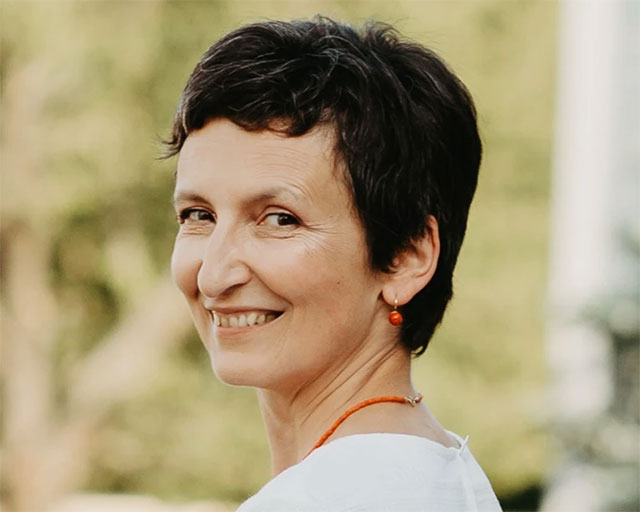Cancer treatment with virus, a new breakthrough in medicine?
A scientist has successfully treated her own breast cancer by injecting a series of specially cultured viruses in the laboratory directly into the tumor. This information immediately sparked a wave of discussion, even controversy, on many related issues, from both medical and ethical perspectives.
In 2020, at the age of 49, Dr. Beata Halassy discovered she had breast cancer. The malignant tumor appeared in the same place where her previous mastectomy had taken place. This was the second recurrence since Halassy's left breast was removed, and she would not be able to face another round of chemotherapy.
Faced with such a dire situation, instead of giving up, Beata Halassy, a virologist at the University of Zagreb (Croatia), chose to fight the disease with science. She studied the literature and decided to perform an unproven treatment on her own body.

A case report published in the journal Vaccines on August 1 outlines how Halassy self-administered a treatment called oncolytic virotherapy (OVT) to treat her own stage 3 cancer. She has now been cancer-free for four years.
By choosing to test the new treatment on his own body, Halassy joined a group of scientists who operate in secrecy, because it is stigmatized and unethical. 'You have to be a brave person to publish this report,' Halassy said.
New therapy
OVT is an emerging field of cancer treatment that uses viruses to attack cancer cells and stimulate the immune system to fight them. Most OVT clinical trials to date have been in late-stage, metastatic cancer. But in recent years, scientists have increasingly turned their attention to earlier-stage disease. An OVT therapy called T-VEC has been approved in the United States to treat metastatic melanoma. However, to date, no OVT has been approved to treat breast cancer at any stage, anywhere in the world.
Halassy emphasizes that she is not an expert on OVT, but her expertise in growing and purifying viruses in the lab gave her the confidence to try the treatment. She targeted her tumor with two different viruses in quick succession—the measles virus and then a vesicular stomatitis virus (VSV). Both pathogens are known to infect the type of cells in which her tumor originated, and have been used in OVT clinical trials. A measles virus has been tested against metastatic breast cancer.
Halassy had previous experience with both viruses, and both had good safety records. The measles strain she chose was widely used in childhood vaccines. The VSV strain, meanwhile, would only cause mild flu-like symptoms.
Over the course of two months, a colleague administered a treatment regimen based on new research Halassy had developed, injected directly into her tumor. Halassy's oncologists agreed to closely monitor her progress as she self-treated, so that she could switch to conventional chemotherapy if problems arose.
The method appeared to be effective: during the course of treatment and without any serious side effects, the tumor shrank significantly and became softer, and also separated from the chest muscle and skin it had invaded, making it easier to remove surgically.
Analysis of the tumor after removal showed that it was completely infiltrated with immune cells called lymphocytes. This showed that the OVT worked as expected and stimulated Halassy's immune system to attack both the virus and the tumor cells. "There was definitely an immune response," Halassy said. After the surgery, she was treated for a year with the anti-cancer drug trastuzumab.
Stephen Russell, an OVT expert who runs the viral therapy biotech company Vyriad in Rochester, Minnesota, agrees that Halassy's case shows that the viral injections were effective in shrinking her tumor, and causing the invasive edges of the tumor to recede.
But he doesn't think Halassy's experience really breaks new ground, since researchers have been trying to use OVT to help treat early-stage cancer. "Really, the novelty here is that she did it herself with a virus that she grew in her own lab."
Ethical issues
Halassy felt a responsibility to publish her findings. But she received numerous rejections from journals—mostly because the paper, co-authored with colleagues, involved Halassy's own experimentation. "The main concern was always the ethical issues," Halassy says.
Jacob Sherkow, a law and medicine researcher at the University of Illinois Urbana-Champaign who has evaluated the ethics of self-testing COVID-19 vaccines, is not surprised that the medical community has expressed concerns.
' The problem is not that Halassy experimented on herself, but that publishing her results could encourage others to reject conventional treatment and try a similar approach ,' Sherkow said. People with cancer are particularly vulnerable to trying unproven treatments. However, Sherkow noted, it is important to ensure that the knowledge gained from self-experimentation is not lost. The paper stressed that self-medication with anti-cancer drugs "should not be the first line of approach" when faced with a cancer diagnosis.
Back at Halassy, she has no regrets about her own treatment. The chances of someone trying to replicate hers are slim, because the treatment requires a lot of scientific knowledge and skill. And the experience has given her own research a new direction: funding to study OVT as a cancer treatment in farmed animals.
Halassy will continue to research and further optimize this potential cancer treatment method in the future.